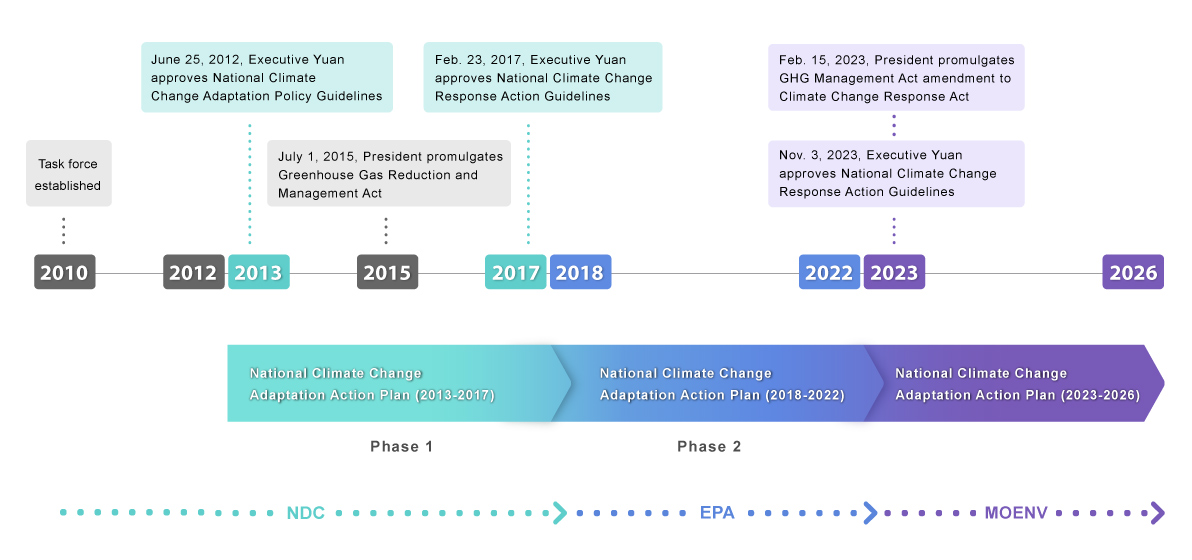National Climate Change Adaptation
The impact of global warming-induced climate change is becoming more apparent by the day. In the past 110 years (between 1911-2020), the yearly average temperature in Taiwan has increased by approximately 1.6 degrees Celsius, and the rate of increase rose in the last 50 years. With the worsening of warming, the number of days with extreme heat has increased, drought and extreme rainfall frequencies has increased, and typhoons have become more powerful, all of which make clear the environmental impacts. In the face of inevitable global warming and climate change, rather than focusing on only greenhouse gas reduction like in the past, since the 2015 Paris Agreement was signed, the international community has put increasing focus on promoting and implementing adaptation strategies as well. However, climate change adaptation is a complex interdepartmental, interdisciplinary issue that encompass scientific research, socioeconomics, and ecology. Only through interdisciplinary collaborations and the public's participation can the crisis of human survival and threat of environmental degradation, both triggered by climate change, be minimized, allowing human civilization to continue developing sustainably.
To enhance Taiwan's ability to respond to climate change, the National Development Council (NDC; originally the Council for Economic Planning and Development) in 2010 established the national climate change adaptation promotion mechanism and the task force for "Climate Change Adaptation Policy Guidelines and Action Plan Planning." In 2012, the "National Climate Change Adaptation Policy Guidelines" were passed, and authorities jointly promoted relevant policies according to the "National Climate Change Adaptation Action Plan (2013-2017)," approved in 2014.
According to "Greenhouse Gas Reduction and Management Act" ("GHG Management Act") regulations, the Ministry of Environment (originally the Environmental Protection Administration, Executive Yuan) submitted for the Executive Yuan's approval the "National Climate Change Response Action Guidelines" (hereinafter referred to as "Action Guidelines"), clearly planning Taiwan's greenhouse gas reduction and climate change adaptation policy directives. In 2018, the Ministry worked with the NDC and 15 other ministries and councils to formulate the "National Climate Change Response Action Program (2018-2022)" to continue promoting Taiwan's adaptation strategies. In 2021, the "GHG Management Act" amendment saw the issue of adaptation added as its own chapter, reinforcing climate change adaptation capability building, scientific research integration, and government department implementation structures. On Feb. 15, 2023, the President promulgated the amendment of the "GHG Management Act" to the "Climate Change Response Act" ("Climate Act"), enhancing the legal basis for Taiwan's climate regulations and meeting international trends.

According to the climate change adaptation chapter of the "Climate Act" and in reference to previous action program's results and issue reviews, the MOENV and other ministries jointly created the "National Climate Change Adaptation Action Plan (2023-2026)," which includes key concepts such as global warming level (GWL), adaptation framework establishment, public engagement, and nature-based solutions (NbS). Through inter-ministerial collaboration, national climate change adaptation strategies are implemented while rolling adjustments are made with the goal of promoting sustainable social, economic, and environmental development in Taiwan.
- Data Source: Climate Change Administration
- Publish Date:2024-01-11
- Update Date: 2024-05-24
